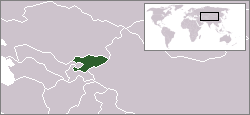Results of the World Governance Assessment for the Kyrgyz Republic have been published

Results of the World Governance Assessment for the Kyrgyz Republic have been published
World Governance Assessment (WGA) is a newly developed tool of measuring governance quality based on a survey of national experts in every country participating in the WGA using a common methodology. This allows basing the assessment on domestic stakeholders’ opinions on governance and, at the same time, to make assessment results comparable across participating countries. The WGA was first conducted in 2001. It was implemented by an international group of research organizations coordinated by the UN University (Tokyo). The first round of assessment covered 23 countries from different parts of the world including Kyrgyzstan. The second round of the assessment was conducted in 2006 using slightly different methodology in the following ten countries and territories: Argentine, Bulgaria, Indonesia,
Kyrgyzstan, Mongolia, Palestine Autonomy, Peru, Trinidad and Tobago, and Uganda. The coordinator of the second round of WGA was Overseas Development Institute (ODI, London); along with a local research organization implemented the assessment in each country. In Kyrgyzstan, both WGA rounds were implemented by the Center for Social and Economic Research CASE-Kyrgyzstan.
